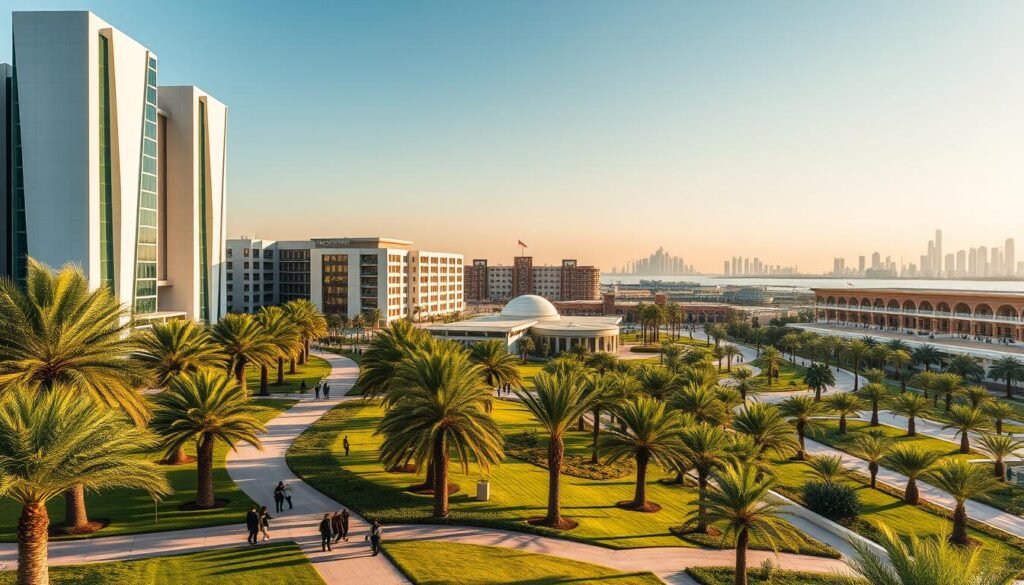What if one person could reshape education across an entire region while balancing tradition and modernity? Sheikha Moza bint Nasser has done exactly that through decades of visionary leadership.
As chair of Qatar Foundation since 1995, she has transformed education, science, and community development. Her work has earned international recognition, with The Guardian calling her “the enlightened face of a profoundly conservative regime.”
For twenty years, she served as UNESCO Special Envoy for Basic and Higher Education. She also advocated for sustainable development goals as a United Nations Advocate.
Her academic background in sociology and public policy informs her approach. She combines deep cultural understanding with global perspectives to drive meaningful change.
Key Takeaways
- Sheikha Moza bint Nasser co-founded and chairs Qatar’s largest nonprofit organization
- She has led educational transformation initiatives for nearly three decades
- International media recognizes her unique role in modernizing conservative systems
- She served as UNESCO Special Envoy for Education for twenty years
- Her work combines traditional values with progressive educational approaches
- She advocates for sustainable development through United Nations platforms
- Her efforts have significantly impacted global education and healthcare reform
Early Life and Educational Foundation
Understanding someone’s background often reveals the roots of their future achievements. The early experiences that shaped this influential leader’s path demonstrate how personal history can fuel global impact.
Formative Years and Family Background
Born in Al Khor, Qatar on August 8, 1959, she grew up in a politically active family. Her father, Nasser bin Abdullah Al-Missned, was a prominent opposition activist.
He led the Al-Muhannada confederation of Bani Hajer. His political activities against the policies of the deposed emir led to imprisonment and exile.
This resulted in much of her childhood being spent in Kuwait. She returned to Qatar in 1977 when political circumstances changed.
Academic Pursuits and Higher Education
Her educational journey reflects a deep commitment to learning. She earned a Bachelor’s degree in Sociology from Qatar University in 1986.
Later, she pursued a Master’s degree in Public Policy in Islam from Hamad Bin Khalifa University. This academic foundation would prove crucial for her future initiatives.
Several prestigious institutions recognized her contributions with honorary doctorates. These included Virginia Commonwealth University (2003), Texas A&M, and Carnegie Mellon.
Imperial College London and Georgetown University also awarded her honorary degrees. These honors acknowledged her work in education and development.
Marriage into Qatar’s Royal Family
1977 marked a significant turning point in her personal life. She returned to Qatar and married Sheikh hamad bin khalifa Al Thani.
He was the heir apparent and would later become emir of Qatar. This marriage made her the second of his three wives.
Her husband hamad bin khalifa would become known as bin khalifa thani after assuming power. This union connected her to the highest levels of Qatari leadership.
The marriage blended her background in political activism with royal influence. This unique position would later enable her educational and philanthropic vision.
Philanthropic Initiatives and Global Impact
Visionary philanthropy creates lasting change across multiple sectors. Her work extends far beyond national borders, addressing critical global challenges through innovative solutions.
Founding of Qatar Foundation and Education City
The Qatar Foundation emerged in 1995 as a transformative force. This non-profit organization revolutionized learning, research, and community development.
Education City stands as its physical manifestation and crowning achievement. This sprawling campus hosts branch campuses of world-renowned universities.
It fosters cutting-edge scientific research and development projects. The foundation’s work has positioned Qatar as an emerging knowledge economy.
Education Above All and Global Access Initiatives
Education Above All launched in 2012 with a bold mission. It focuses on delivering quality learning to marginalized children worldwide.
The organization targets conflict zones and areas of extreme poverty. Its programs have reached millions of out-of-school children across the globe.
She advocated strongly for protecting schools in war zones. This led to the UN International Day to Protect Education from Attack.
Her speeches at UN observances highlighted education’s role in peacebuilding. The Protect Education in Insecurity and Conflict program became a key initiative.
Healthcare Advancements and Medical Research
Healthcare transformation represents another pillar of her philanthropic vision. She chairs the Sidra Medical and Research Center, a $7.9 billion facility.
This high-tech hospital specializes in women’s and children’s health. It combines patient care with groundbreaking medical research.
Her involvement extends to Weill Cornell Medical College in Qatar. She serves on the Board of Overseers of Weill Cornell Medicine.
Autism research receives particular attention and support. These efforts have advanced specialized care for neurodiverse individuals.
Advocacy for Women, Children, and Social Development
Social development initiatives address systemic challenges across communities. Silatech, launched in 2008, tackles youth unemployment in Arab nations.
The organization creates economic opportunities for young people. It has connected thousands with jobs and entrepreneurship resources.
Her advocacy strongly supports women’s rights and children’s welfare. This includes combating domestic violence and improving labor protections.
The Doha International Family Institute promotes family stability research. The Supreme Council for Family Affairs advances social development policies.
Forbes recognized these efforts by naming her among the ‘100 Most Powerful Women’. The World Innovation Summit for Health and Education further extends her global influence.
Political Influence and Public Persona
Beyond philanthropy lies a sophisticated strategy of international influence. This leader’s approach combines educational diplomacy with strategic visibility to reshape global perceptions.
Role in Qatar’s Soft Power Strategy
Education became a powerful tool for international relations. The Qatar Foundation created bridges between cultures through academic partnerships.
These initiatives transformed the country’s global image from energy exporter to knowledge hub. World-class universities established campuses in Doha through these efforts.
This educational diplomacy built lasting relationships with powerful nations. It positioned Qatar as a modern mediator in regional affairs.
International Recognition and Honors
Global institutions have celebrated this transformative work. Forbes magazine included her among the 100 powerful women in both 2007 and 2010.
Gulf Business recognized her influence repeatedly from 2013 to 2017. She received Britain’s honorary damehood for services to education.
The Carnegie Medal of Philanthropy acknowledged her charitable impact. The Chatham House Prize celebrated contributions to international relations.
Even a former U.S. president recognized her excellence in public service. These honors reflect decades of dedicated work.
Public Image and Media Representation
Fashion became another platform for cultural diplomacy. Vanity Fair consistently featured her customized haute couture designs.
She helped launch Fashion Trust Arabia to support regional designers. This blended traditional aesthetics with contemporary global fashion.
Her public appearances always carried diplomatic significance. Each choice communicated specific messages about modern Arab identity.
Recent Political Engagement and Social Media Presence
Social media platforms now amplify her political voice. Recent posts have addressed the Palestinian situation with strong positions.
This digital advocacy aligns with Qatar’s foreign policy objectives. It demonstrates how personal influence supports national interests.
In 2023, she resigned as UNESCO Special Envoy over Palestinian children’s plight. This dramatic move highlighted her commitment to advocacy.
The Pandora Papers revealed lawful property investments through offshore entities. These £120 million London purchases showed sophisticated financial planning.
Throughout her public life, she has balanced multiple roles effectively. Her influence continues to shape both policy and perception.
Conclusion: The Enduring Legacy of Sheikha Moza bint Nasser
Her work has shaped education and healthcare across the globe. For many years, she led efforts that reached millions.
Through the Qatar Foundation and Education Above All, she brought learning to children in need. Her focus on health improved care for women and families.
She also helped young people find jobs and supported autism research. Her role in the royal family gave her a unique platform for change.
She used this position to advocate for sustainable development and peace. Her legacy continues to inspire progress around the world.
FAQ
What is the Qatar Foundation, and why was it established?
The Qatar Foundation is a non-profit organization founded in 1995 to support education, science, and community development. It aims to transform the nation into a knowledge-based economy and improve lives through learning and innovation.
How has Sheikha Moza bint Nasser contributed to global education access?
Through initiatives like Education Above All, she has helped provide quality schooling to millions of out-of-school children worldwide, focusing on conflict-affected and marginalized communities.
What role does she play in advocating for women and children?
She actively promotes gender equality, children’s rights, and social development through various programs, policy influence, and international partnerships aimed at empowering vulnerable groups.
Has she received any international recognition for her work?
A> Yes, she has been honored with numerous awards, including being named one of Forbes’ 100 Most Powerful Women and receiving prestigious accolades for her contributions to education and humanitarian efforts.
How does her work impact healthcare and medical research?
She supports advancements in medical research and healthcare services through foundations and initiatives that focus on improving treatment, prevention, and health education both in Qatar and globally.







